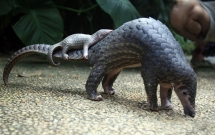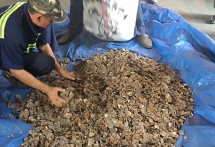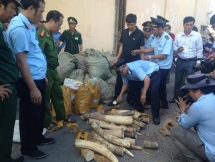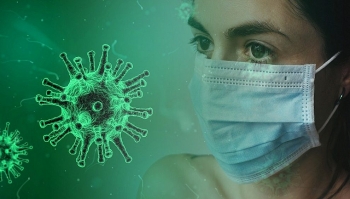Pangolin officially removed from Chinese traditional medicine list
| Pangolin and five facts you may not know | |
| HCM City: 3.3 tonnes of pangolin scales confiscated | |
| Smuggled elephant tusks and pangolin scales seized in Da Nang city |
 |
| China removed pangolins from its traditional medicine list. Photo: livekindly |
China has removed pangolin parts from its official list of traditional medicines, days after increasing legal protections on the endangered animal, reported AFP. Accordingly, the latest version of the Chinese Pharmacopoeia for 2020 does not include pangolins, stressed that "depleted wild species will be withdrawn from the pharmacopoeia", which means the mammals will no longer be used in traditional Chinese medicine (TCM). In the past, the scales of pangolin have been legally sold in traditional pharmacies and markets in China as a medical ingredient to treat everything from lactation problems to arthritis.
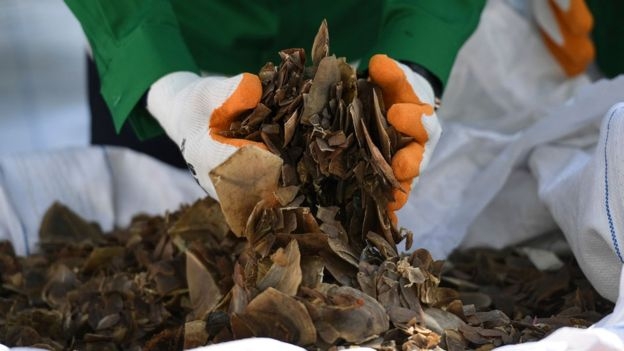 |
| Hundreds of thousands of pangolins have been killed for their scales. Photo: Getty Images |
Pangolins have received particular attention since the beginning of the coronavirus (COVID-19) outbreak. The zoonotic virus is thought to have originated in bats. However, many experts have suggested that pangolins may have been the intermediary host between bats and humans.
According to National Geographic, medicinal use of the scales has pushed the world’s pangolin species into the situation of extinction. Tens of thousands of the animals, which resemble scaly anteaters, are killed annually for their meat—considered a luxury food in China and Vietnam—as well as their scales, curved disks of keratin, the same substance that's in human fingernails.
“This is the single greatest measure that could be taken to save the pangolins,” said Peter Knights, CEO of WildAid, an environmental nonprofit organization that focuses on reducing demand for wildlife products. “This sends a clear message that there are alternatives in traditional Chinese medicine and so you don’t need to use pangolins,” he told National Geographic.
“I am very encouraged,” said Zhou Jinfeng, secretary-general of the China Biodiversity Conservation and Green Development Foundation (CBCGDF), reported in the Guardian. Jinfeng has long campaigned for improving the protection of pangolins and against the use of their scales in medicine. “Our continuous efforts for several years have not been in vain”, Zhou added.
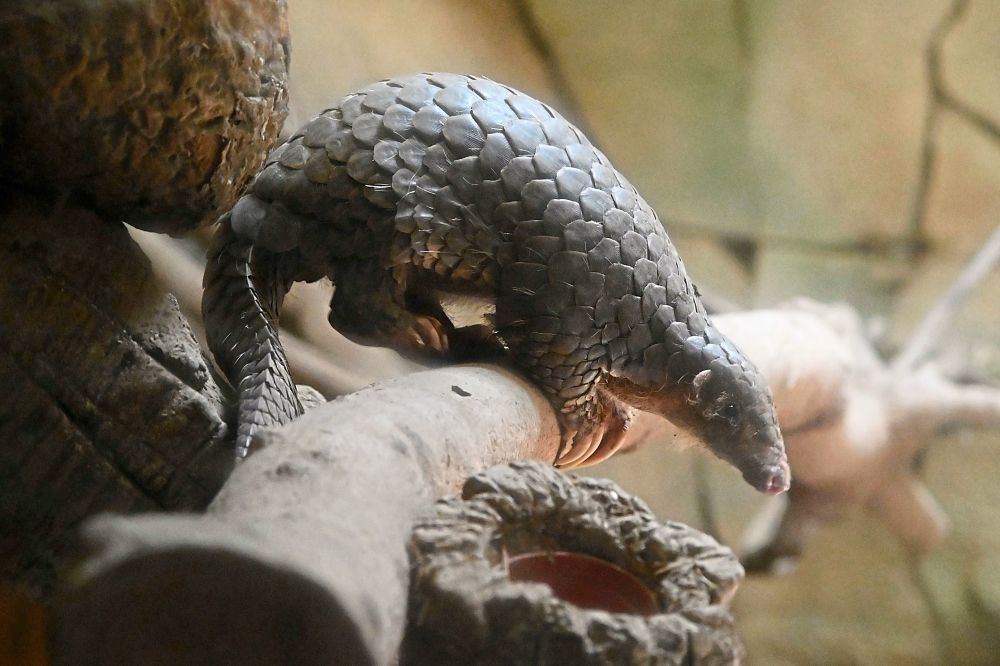 |
| This animal is a suspect in the outbreak. Photo: AP |
Katheryn Wise of animal welfare campaign group, World Animal Protection, shared with BBC that, it was "great news" that China had upgraded pangolins to the highest level of protection and removed them from the Chinese Pharmacopoeia. She called for this to be extended to all wild animals, "who, like pangolins, are poached from the wild and often placed in squalid, cramped cages, creating a lethal hotbed of disease".
"Removing the animal from the pharmacopoeia would effectively reduce consumption demand for pangolins and curb illegal hunting and trading," Sun Quanhui, a scientist from World Animal Protection, told the Global Times.
A statistic revealed by the Global Times shows that in the late 1990s, the number of native pangolins in China was about 60,000, widely distributed in 11 provinces and regions. However, the number has declined by about 90 percent, estimated by the Species Survival Committee of the International Union for Conservation of Nature.
China started banning pangolin hunting in the wild in 2007 and stopped commercial imports of pangolins and pangolin products in 2018. This country also has banned the sale of wild animals for food in recent months due to the fear of the potential risk of diseases spreading to humans, reported AFP.
The World Wide Fund for Nature said it 'strongly welcomed' China's move to upgrade protections for the pangolin, calling it an 'important respite' from the illegal pangolin trade. Until now, pangolins are not the first animals whose medicinal standards have been outlawed. Rhinoceros horns and tiger bones are also banned from being used in TCMs after China banned the trade of these goods and related products in 1993, according to the Global Times.
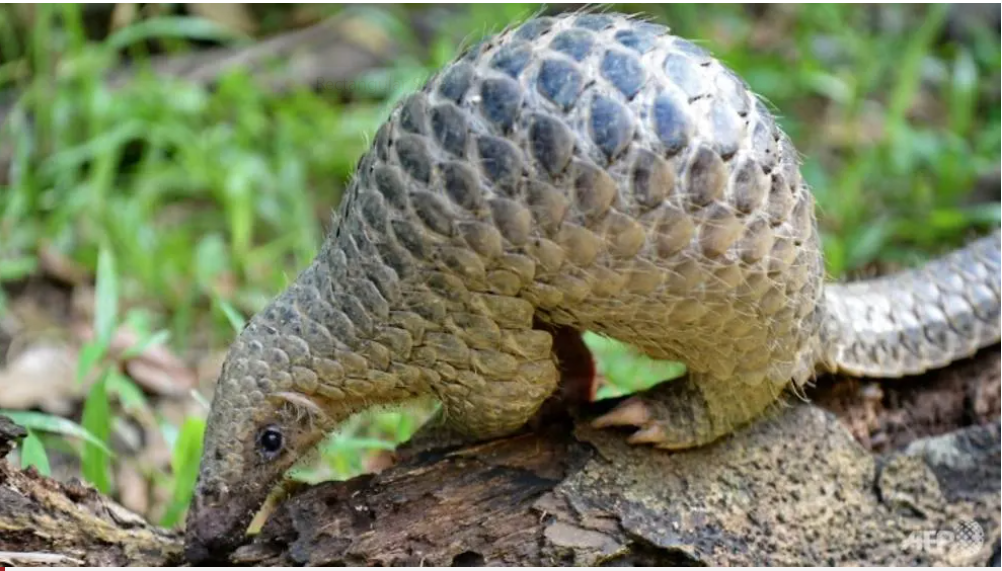 |
| The pangolin, the most trafficked mammal on Earth, is prized for its meat and its unique scales, which are said to have medicinal properties. Photo: AFP |
| Pangolins have large, protective keratin scales covering their skin; they are the only known mammals with this feature. They live in hollow trees or burrows, depending on the species. Pangolins are nocturnal, and their diet consists of mainly ants and termites, which they capture using their long tongues. They tend to be solitary animals, meeting only to mate and produce a litter of one to three offspring, which they raise for about two years. Pangolins are threatened by poaching (for their meat and scales, which are used in Chinese traditional medicine for a variety of ailments including excessive anxiety and hysterical crying in children, women thought to be possessed by devils and ogres, malarial fever, and deafness) and heavy deforestation of their natural habitats, and are the most trafficked mammals in the world. As of January 2020, of the eight species of pangolin, three (Manis culionensis, M. pentadactyla and M. javanica) are listed as critically endangered, three (Phataginus tricuspis, Manis crassicaudata and Smutsia gigantea) are listed as endangered and two (Phataginus tetradactyla and Smutsia temminckii) are listed as vulnerable on the Red List of Threatened Species of the International Union for Conservation of Nature.
|
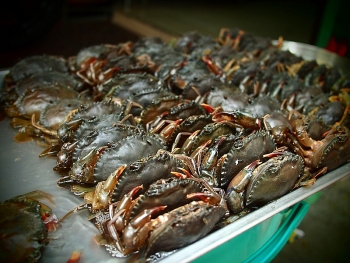 | China increases crab purchase from Vietnam in first four months 2020 Vietnam's crabs export to China in the first 4 months this year tripled amid the Covid-19 pandemic. |
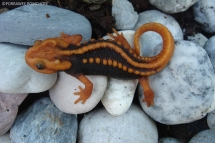 | WWF discovers 87 new species in Vietnam Up to 87 out of 163 new species found in the Greater Mekong region were discovered in Vietnam, which proves the country is rich in ... |
Recommended
 World
World
Pakistan NCRC report explores emerging child rights issues
 World
World
"India has right to defend herself against terror," says German Foreign Minister, endorses Op Sindoor
 World
World
‘We stand with India’: Japan, UAE back New Delhi over its global outreach against terror
 World
World
'Action Was Entirely Justifiable': Former US NSA John Bolton Backs India's Right After Pahalgam Attack
 World
World
Nifty, Sensex jumped more than 2% in opening as India-Pakistan tensions ease
 World
World
Easing of US-China Tariffs: Markets React Positively, Experts Remain Cautious
 World
World
India strikes back at terrorists with Operation Sindoor
 World
World

